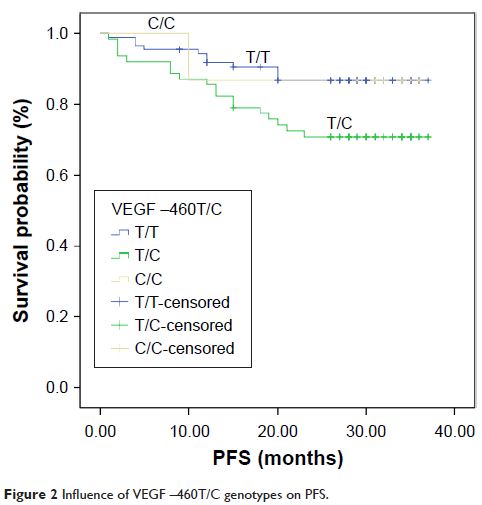109568
论文已发表
注册即可获取德孚的最新动态
IF 收录期刊
- 3.4 Breast Cancer (Dove Med Press)
- 3.2 Clin Epidemiol
- 2.6 Cancer Manag Res
- 2.9 Infect Drug Resist
- 3.7 Clin Interv Aging
- 5.1 Drug Des Dev Ther
- 3.1 Int J Chronic Obstr
- 6.6 Int J Nanomed
- 2.6 Int J Women's Health
- 2.9 Neuropsych Dis Treat
- 2.8 OncoTargets Ther
- 2.0 Patient Prefer Adher
- 2.2 Ther Clin Risk Manag
- 2.5 J Pain Res
- 3.0 Diabet Metab Synd Ob
- 3.2 Psychol Res Behav Ma
- 3.4 Nat Sci Sleep
- 1.8 Pharmgenomics Pers Med
- 2.0 Risk Manag Healthc Policy
- 4.1 J Inflamm Res
- 2.0 Int J Gen Med
- 3.4 J Hepatocell Carcinoma
- 3.0 J Asthma Allergy
- 2.2 Clin Cosmet Investig Dermatol
- 2.4 J Multidiscip Healthc

VEGF-460T/C 基因多态性与应用强调放疗治疗鼻咽癌的临床结果之间的关联
Authors Tan JY, Jiang L, Cheng XW, Wang CL, Chen JS, Huang XQ, Xie P, Xia DM, Wang RS, Zhang Y
Received 31 October 2016
Accepted for publication 5 January 2017
Published 15 February 2017 Volume 2017:10 Pages 909—918
DOI https://doi.org/10.2147/OTT.S126159
Checked for plagiarism Yes
Review by Single-blind
Peer reviewers approved by Dr Amy Norman
Peer reviewer comments 2
Editor who approved publication: Prof. Dr. Geoffrey Pietersz
Abstract: Vascular endothelial growth factor (VEGF) is a potent angiogenic factor
that plays a critical role in the development, metastasis, and recurrence of
tumors. This study aims to determine the correlation of single-nucleotide
polymorphisms in the VEGF gene with the prognosis of
nasopharyngeal carcinoma (NPC). The VEGF –460T/C gene polymorphisms in the
genomic DNA of the blood samples of 338 patients with NPC were investigated
through polymerase chain reaction and direct DNA sequencing. Results showed a
significant association between the –460C-allele carriers and the aggressive forms
of NPC as defined by stages N2–3 (odds ratio =1.820, 95% confidence interval
[CI]: 1.118–2.962, P =0.015). Furthermore, the VEGF
–460T/C polymorphism was significantly associated with 3-year overall survival
(OS), distant metastasis-free survival (DMFS), and progression-free survival
(PFS) (T/C + C/C vs T/T: 3-year OS 78.8% vs 95.1%, P =0.003; 3-year
DMFS 80.2% vs 90.6%, P =0.036; 3-year PFS 73.9% vs
86.7%, P =0.042) but was not associated
with the local recurrence-free survival (LRFS) of the patients. The multivariate
analysis indicated that the VEGF –460C-allele carrier was an independent
significant prognostic factor for OS (hazard ratio [HR] 4.096, 95% CI:
1.333–12.591, P =0.014). N classification was an
independent significant prognostic factor for DMFS in patients with
locoregionally advanced NPC (HR 3.674, 95% CI: 1.144–11.792, P =0.029). However,
neoadjuvant chemotherapy (NACT) followed by concurrent chemoradiotherapy (CCRT)
was not superior to CCRT alone in terms of the 3-year OS, LRFS, DMFS, and PFS
of patients with VEGF –460T/C polymorphism. In conclusion, the VEGF –460T/C
gene polymorphism may negatively affect the clinical outcomes of patients with
NPC and may be considered a potential prognostic factor for this disease.
Keywords: vascular endothelial growth factor,
gene polymorphism, nasopharyngeal carcinoma, clinical outcomes
